| The President's Emergency Plan for AIDS Relief – September-October 2008 Newsletter  PDF version PDF version
|
Inside this Edition:
Kikwete Meets with President Bush, Announces New Partnership for HIV/AIDS Care & Treatment [more]
President Bush Addresses the United Nations General Assembly [more]
President John Kufuor of Ghana Visits the White House [more]
In Mozambique, Small Grants Program Supports Community [more]
In Zambia, U.S. Mission Staff Visit PEPFAR-Supported Programs [more] |
Kikwete Meets with President Bush, Announces New Partnership for HIV/AIDS Care & Treatment
 Tanzanian President Jakaya Kikwete traveled to the United States in late August for a three-day state visit at the invitation of President George W. Bush. Tanzanian President Jakaya Kikwete traveled to the United States in late August for a three-day state visit at the invitation of President George W. Bush.
On August 29, President Kikwete met with President Bush at the White House to discuss the successes seen in Tanzania as a result of the U.S. President’s Emergency Plan for AIDS Relief (PEPFAR).
“PEPFAR is helping us tackle [the] HIV/AIDS scourge. Many lives – many, many children now who would have been orphaned are no longer orphaned because of that,” said Kikwete.
At the end of 2007, it is estimated that 1.4 million Tanzanians – 6.2 percent of the population – were living with HIV/AIDS.
As of March 31, 2008, PEPFAR has supported lifesaving antiretroviral treatment for over 114,000 Tanzanians. In Fiscal Year 2007, PEPFAR also supported care for more than 274,000 people living with HIV/AIDS, and 471,000 orphans and vulnerable children in Tanzania. Since the inception of PEPFAR, nearly 1,120,000 pregnant women have received HIV counseling and testing services for prevention of mother-to-child HIV transmission (PMTCT), and over 47,000 pregnant women have received antiretroviral prophylaxis for PMTCT. |
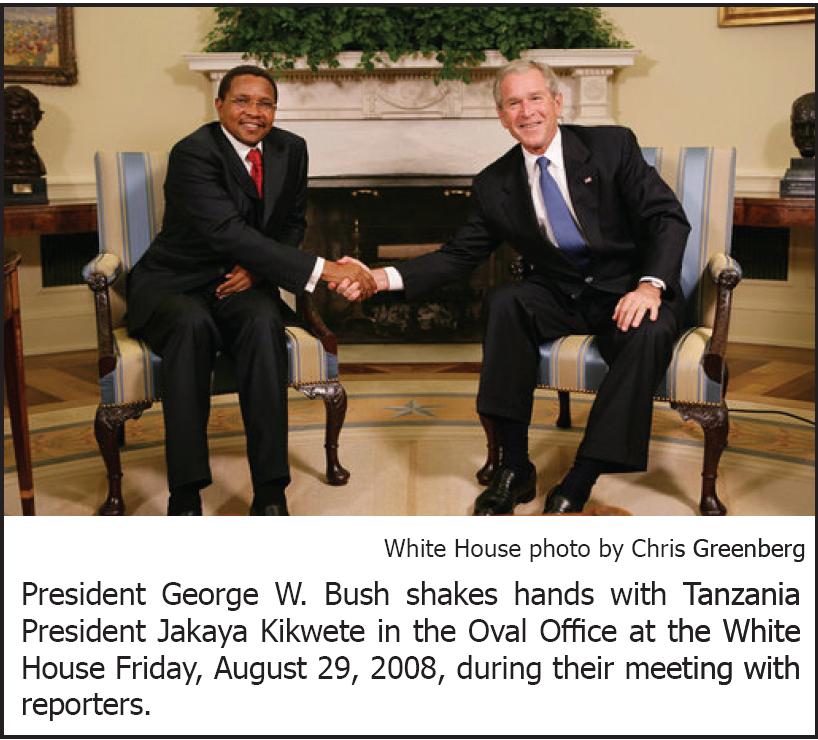
|
|
“You’ve done so much for Africa, so much for Tanzania. When you compare, no U.S. President has done so much for Africa and for Tanzania as you have done,” said Kikwete.
While in Washington D.C., Kikwete also participated in a press conference announcing a new Public-Private Partnership that will enable the Baylor International Pediatric AIDS Initiative (BIPAI) to expand its network of centers of excellence in sub-Saharan Africa by building two facilities in Mbeya and Mwanza, Tanzania.
With $22.5 million in PEPFAR support over the next five years, these centers will provide comprehensive pediatric and family-centered HIV/AIDS care and treatment. The centers are expected to provide direct care to at least 15,000 children and to reach another 4,000 children through associated satellite facilities.
“We are thrilled to partner with the government of Tanzania in the establishment of these new children’s centers of excellence. We are deeply grateful to PEPFAR and to the U.S. Agency for International Development and Centers for Disease Control and Prevention teams for all of their support, as well as to the generous private donors that made all of this possible,” said Mark W. Kline, M.D., president of BIPAI.
BIPAI secured an additional $6 million for this program from private donors including the Abbott Fund, the Bristol-Myers Squibb Foundation, Jan and Dan Duncan, and the Sisters of Charity of the Incarnate Word. | 
President Bush Addresses the United Nations General Assembly
 On September 23, 2008, President George W. Bush delivered his final address to the United Nations General Assembly in New York. On September 23, 2008, President George W. Bush delivered his final address to the United Nations General Assembly in New York.
During his remarks, President Bush highlighted the progress of the U.S. President’s Emergency Plan for AIDS Relief (PEPFAR), working in partnership with host nations, since its inception in 2003.
"Five years ago, 50,000 people in sub-Saharan Africa were receiving treatment for HIV/AIDS. Today that number is nearly 1.7 million," he said.
And while PEPFAR has had many successes, Bush acknowledged that the fight against HIV/AIDS is far from over, and called on nations around the globe to continue the battle.
"Multilateral organizations have made bold commitments of their own to fight disease. The G8 has pledged to match America’s efforts on malaria and HIV/AIDS. Through the Global Fund, many countries are working to fight HIV/AIDS, malaria, and TB. Lives in the developing world depend on these programs, and all who have made pledges to fight disease have an obligation to follow through on their commitments," he said.
Bush urged attendees to apply their knowledge and experience towards countries most impacted by the HIV/AIDS pandemic. |
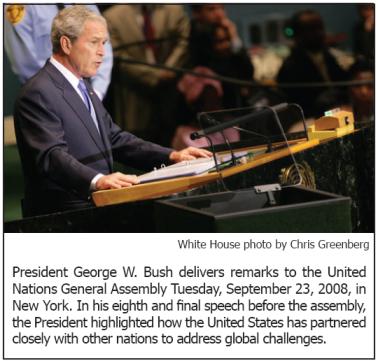
|
|
"Experience also shows that to be effective, we must adopt a model of partnership, not paternalism. This approach is based on our conviction that people in the developing world have the capacity to improve their own lives – and will rise to meet high expectations if we set them," he said. |
President John Kufuor of Ghana Visits the White House
 On September 15, 2008, Ghanaian President John Kufuor returned to the White House at the invitation of President George W. Bush. On September 15, 2008, Ghanaian President John Kufuor returned to the White House at the invitation of President George W. Bush.
During his arrival ceremony, President Kufuor spoke about the impact of the U.S. President’s Emergency Plan for AIDS Relief (PEPFAR) in Ghana and throughout Africa.
"President Bush’s Emergency Plan for AIDS Relief has dramatically increased financial resources to Ghana and other afflicted countries in the fight against the pandemic. These are only some of the great benefits to Ghana and some other African countries, which can only be described as your humanitarian policies to Africa, Mr. President.
"Under your watch you have increased the support for the fight against HIV/AIDS, which is devastating many countries on our continent. …I believe that’s humanitarian, and you have to be accorded the credit for this gesture." |
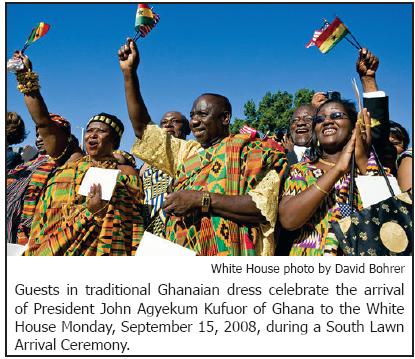
|
|
In Mozambique, Small Grants Program Supports Community
|
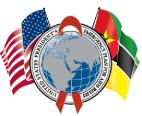
In Zongoene, Mozambique, a local organization assisted by a Peace Corps volunteer has leveraged support from the U.S. President’s Emergency Plan for AIDS Relief (PEPFAR) to assist orphans and vulnerable children (OVCs) affected by HIV/AIDS through agriculture and beekeeping.
This project is designed to augment food consumption among families in need, teach efficient farming techniques and generate income for families selling excess production.
In support of this project, the Government of Mozambique granted 50 plots of land, allowing members of the community to grow fruits and vegetables for 50 families, including 120 OVCs. Nearly all of the community members involved in the project are women who work together on communal plots to provide for their families.
Despite difficulties resulting from rain and flooded fields, participants are pleased with their progress and are confident that this project will be successful. Their enthusiasm, close relationship with the local government and use of agriculture experts – together with a dedicated group of families working the fields – have translated into a successful pilot.
This project is supported by the PEPFAR "Small Grants Program" to assist Mozambican organizations as they develop capacity in HIV/AIDS prevention. Currently, the Small Grants program supports projects in every province of Mozambique except Cabo Delgado.
. |
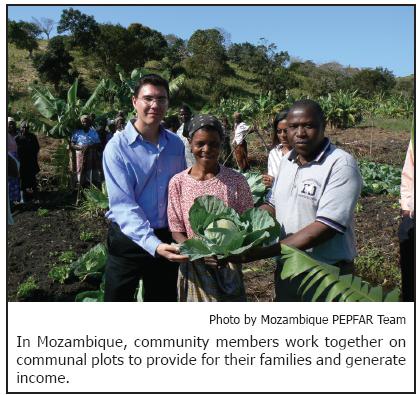
|
In Zambia, U.S. Mission Staff Visit PEPFAR-Supported Programs
|

From September 7-13, 2008, a team from the U.S. Mission in Lusaka undertook a tour of Zambia’s Western Province that saw them crisscrossing the flood plains and visiting numerous remote programs that are supported by the American people.
During their trip, the team visited heath facilities supported by the U.S. President’s Emergency Plan for AIDS Relief (PEPFAR) and officially handed over the new Mitete Rural Health Center voluntary HIV counseling and testing lab.
The team also visited a PEPFAR-supported health campaign at Kabeti Fishing Camp, in the middle of the flood plain. During the campaign, villagers from the nearby seasonal fishing camp were given access to free HIV counseling and testing, health messages and antenatal care.
As with previous provincial visits, the delegation also spent time greeting local journalists and paid visits to both community radio stations, Radio Lyambai and Oblate Radio Liseli.
At Liseli, a Mission team recorded an interview and then watched the taping of Fala Mwa Lilangu, a PEPFAR-supported Lozi-language radio drama that helps educate listeners about HIV/AIDS. A Tonga-language version of this program is already a success in Zambia’s Southern Province. |
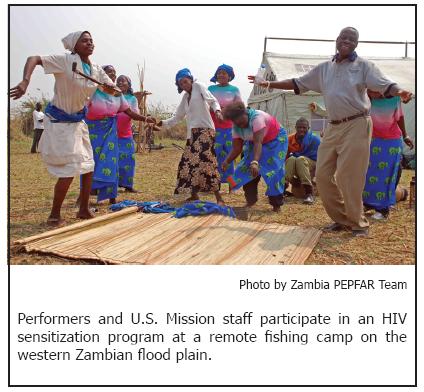
|
|
| | |
| |  |  |




 PDF version
PDF version 